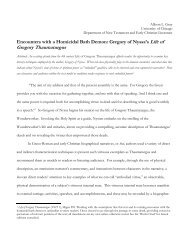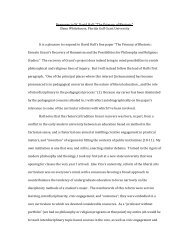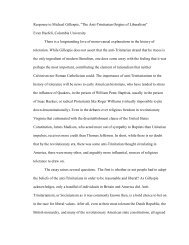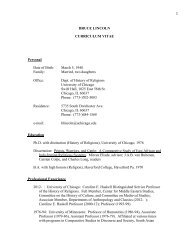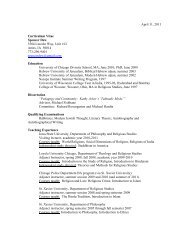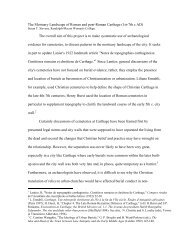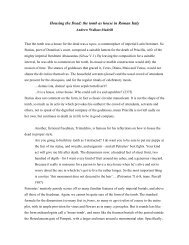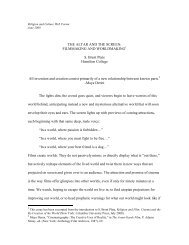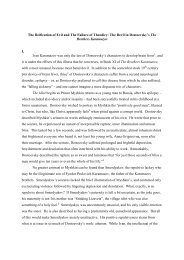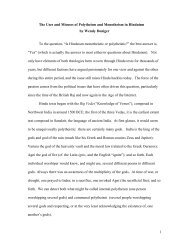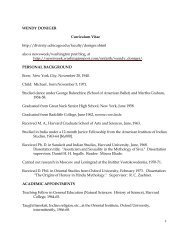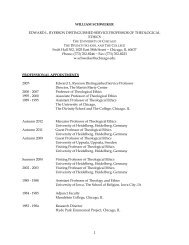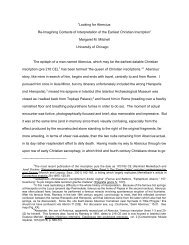*Criterion Winter 02-4.16 - Divinity School - University of Chicago
*Criterion Winter 02-4.16 - Divinity School - University of Chicago
*Criterion Winter 02-4.16 - Divinity School - University of Chicago
You also want an ePaper? Increase the reach of your titles
YUMPU automatically turns print PDFs into web optimized ePapers that Google loves.
Religion and Science, Faith and Reason, Continued from page 9<br />
sense <strong>of</strong> things. The world is too complex a place to try to<br />
decipher cold, as it were. Mind-sets point us in one direction<br />
or another. Because they determine what constitute good<br />
reasons and allow us to recognize the strength <strong>of</strong> arguments,<br />
perhaps one does not want to say that they themselves are<br />
rational. They are arational and stand outside <strong>of</strong> reason<br />
ins<strong>of</strong>ar as they determine in part what we find reasonable<br />
and what we do not. Or, better, perhaps we should say that<br />
mind-sets are prerational. Even so, not all mind-sets are on<br />
an equal plane. In some circumstances, for example, it is<br />
appropriate to be suspicious <strong>of</strong> conspiracies, in which case<br />
the paranoid may turn out to be right. The conspiratorial<br />
mind-set might also be appropriate for a CIA agent or police<br />
detective, allowing him or her to see things that the rest <strong>of</strong><br />
us might miss—things that are really there. In this way, to<br />
compare the theistic mind-set with other mind-sets is by no<br />
means to patronize it, but to observe, with Pascal, that it is<br />
not an epistemic position at which we can arrive by simple<br />
argument. Perhaps one could judge mind-sets by their<br />
consequences—by the truth or falsity <strong>of</strong> the beliefs to which<br />
they give rise. But this would presuppose that we have some<br />
independent way <strong>of</strong> judging the truth-value <strong>of</strong> the consequences.<br />
Sometimes we may; sometimes we may not. (In any<br />
case, I do not want to suggest that there are not truth-values<br />
for these states <strong>of</strong> affairs independent <strong>of</strong> our mind-sets and<br />
the beliefs that they engender. The paranoid may be wrong<br />
or he may be right, but I do not want to say that his world<br />
is right for him, and ours for us.)<br />
SOME TENTATIVE CONCLUSIONS<br />
Ibegan with the problem <strong>of</strong> science and religion. For<br />
some, the two are incompatible and completely irreconcilable.<br />
But other, more recent thinkers see the two as fully<br />
compatible and argue for a close relation between them. As<br />
I said earlier, I am somewhat suspicious <strong>of</strong> these recent<br />
attempts to put science and religion together. The tools I<br />
developed earlier <strong>of</strong>fer us a way to understand the tension<br />
between the two.<br />
In order to illuminate the conflict between science and<br />
religion, let me begin by saying a bit more about science.<br />
I am skeptical <strong>of</strong> talking about science in general terms; it<br />
is a complex notion and there are significant differences<br />
from one science to another and from one time period to<br />
another. In particular, the question <strong>of</strong> the relation between<br />
science and religion differs enormously if one is talking<br />
about Bacon or Descartes or Newton, as opposed to a more<br />
36 WINTER 20<strong>02</strong><br />
recent figure. But if we acknowledge that we are talking<br />
about our own times, then it may be possible to give an<br />
account <strong>of</strong> at least one important strand <strong>of</strong> what science<br />
means for us today, a strand that one can probably trace back<br />
to the Enlightenment.<br />
The conception <strong>of</strong> science I have in mind is nicely<br />
summarized in the course <strong>of</strong> a trial, McLean v. Arkansas,<br />
decided on January 5, 1982. This trial concerned Act 590<br />
<strong>of</strong> 1981 <strong>of</strong> the General Assembly <strong>of</strong> the State <strong>of</strong> Arkansas,<br />
which mandated that “public schools within the State shall<br />
give balanced treatment to creation-science and to evolutionscience.”<br />
4 Opponents <strong>of</strong> the law argued that creation-science<br />
is not science, but religion. The question <strong>of</strong> what constitutes<br />
a science and how it differs from religion thus became one<br />
<strong>of</strong> the trial’s central issues and the main question addressed<br />
by Michael Ruse, a philosopher <strong>of</strong> science who testified as<br />
an expert witness for the plaintiffs. His testimony was<br />
reflected in the final decision <strong>of</strong> Judge William R. Overton;<br />
it included the following list <strong>of</strong> what he called “the essential<br />
characteristics <strong>of</strong> science”:<br />
1. it is guided by natural law<br />
2. it has to be explanatory by reference to<br />
natural law<br />
3. it is testable against the empirical world<br />
4. its conclusions are tentative, i.e., are not necessarily<br />
the final word<br />
5. it is falsifiable 5<br />
Implicit in this characterization <strong>of</strong> science are two different<br />
distinctions between science and religion—one that we<br />
might call metaphysical, the other more epistemological.<br />
The metaphysical distinction concerns allowable mechanisms<br />
in explaining phenomena in the physical world. In<br />
his testimony, Ruse made the following statement:<br />
. . . The most important characteristic <strong>of</strong> modern<br />
science is that it depends entirely on the operation<br />
<strong>of</strong> blind, unchanging regularities in nature. . . .<br />
Therefore, any reliance on a supernatural force, a<br />
Creator intervening in a natural world by supernatural<br />
processes, is necessarily not science.” 6<br />
A scientific explanation thus excludes God; it is cast entirely<br />
in terms <strong>of</strong> natural law. This calls to mind Laplace’s famous<br />
remark when asked where God appeared in his astronomy: “I<br />
have no need <strong>of</strong> that hypothesis in my system.”<br />
A second, and perhaps related, feature <strong>of</strong> science—one<br />
that distinguishes it from religion—is the kind <strong>of</strong> evidence to




